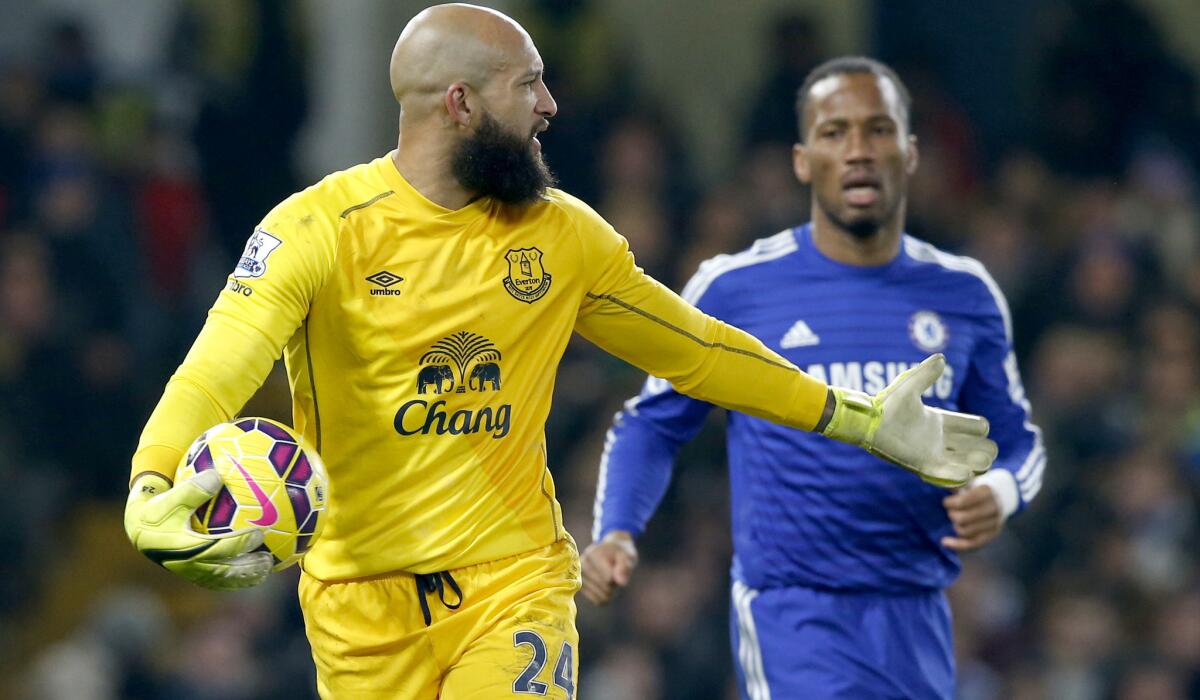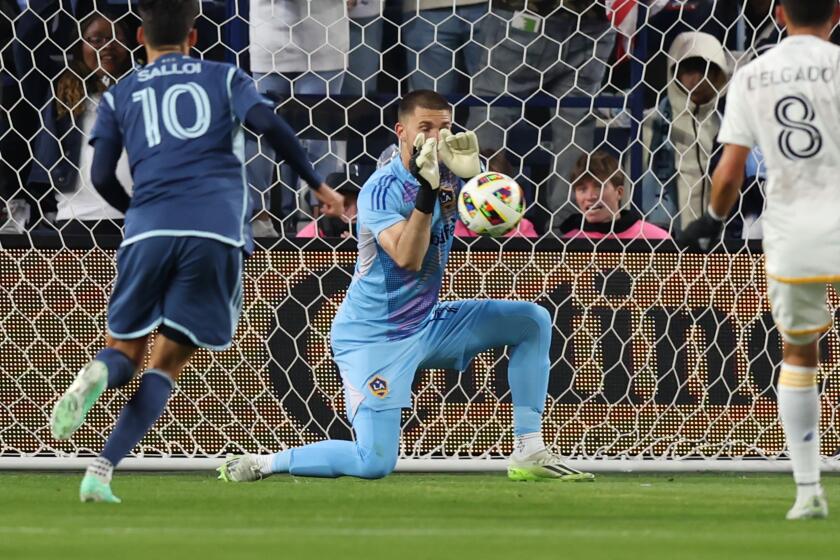English Premier League’s tournament absences are strengths, not weaknesses

American star Tim Howard has made more than 300 appearances for Premier League team Everton since 2006.
When the UEFA Champions League resumes this week, the quarterfinals will feature both of last year’s finalists, the last two tournament champions and the leaders of four of Europe’s top five leagues.
What it won’t include is a representative from the English Premier League.
Ditto the Europa League, which begins its quarterfinals Thursday with defending champion Sevilla heading a field that includes two Ukrainian teams, two Italian teams and one each from Belgium, Germany and Russia — but none from Great Britain.
It’s the first time since 1993, the season the EPL was formed, that the league failed to make the elite eight in both of Europe’s major club competitions. But rather than marking a decline, the unusually early exits say more about the vitality — and profitability — of the English Premier League than they do about the strength of the German and Spanish superclubs that have come to dominate those tournaments.
“I hear everyone talking about the recent ‘failure’ in the Champions League being indicative of the Premier League’s regression,” Kyle Martino, a studio analyst for NBC, wrote in an email from England, where he will cover Sunday’s Manchester Derby between Manchester City and Manchester United. “I don’t agree. English clubs coming up short in Europe, for me, is actually a negative consequence of … positive trends.
“The English Premier League has become the most competitive league in the world. That level of competition, where any team can win on any given weekend, keeps … the league so tight that big clubs can’t prioritize a strong run in Champions League by resting players for league games.”
Contrast that with the last two Champions League winners, who had little else to play for midway through their respective league seasons.
In 2013, Bayern Munich, featuring six players who would later take Germany to a World Cup win, clinched the Bundesliga title with nearly two months left on the schedule. It finished 25 points clear of second-place Borussia Dortmund in the standings and compiled a goal differential of 80, more than twice as big as any other team in the league.
That made the final quarter of the Bundesliga season completely irrelevant. And with Bayern winning six matches by five goals — and one by a 9-2 count — even games the champions played in were hardly worth watching.
Last year, Real Madrid beat Spanish rival Atletico Madrid in the final after an uncompelling La Liga season in which the top three teams — the two Madrid squads, plus Lionel Messi’s Barcelona — all won at least seven more games than any other team in the league.
And that was considered a competitive year. With Barcelona and Real Madrid having combined to win 25 of the last 30 league titles, Spain’s domestic season normally holds little interest for supporters of the other 18 teams.
Now compare that to the last full EPL season, in which the champion wasn’t decided until the final half of the final game. In 2012, Manchester City needed two goals in stoppage time of the final game to win the title.
So while EPL teams have become less competitive on the continent, winning just one of the last six Champions League titles and one of the last 13 Europa League crowns, the league has become the most competitive, and popular, one in the world.
Thanks to lucrative sponsorship and TV deals, all 20 of the league’s teams rank among the top 40 richest clubs in the world, according to Deloitte, a leading sports business analyst. And that money has further dampened the importance of the major European tournaments for English clubs.
According to Goal.com, Cardiff City made more in TV revenue while finishing last in the EPL in 2013-14 than Real Madrid got for finishing first in the Champions League. When the EPL’s record $8-billion domestic TV deal goes into effect in 2016, that gap will grow even bigger with teams relegated to the second-tier Championship earning three times more in prize money than the winner of the Champions League.
That doesn’t make the Champions League less prestigious. But it does make it less lucrative.
To qualify for the annual tournament, an EPL team must finish in the top four in the league standings; fifth place means a berth in the Europa League. By 2016, however, winning the Premier League will be worth nearly four times what winning the Champions League was worth last year, and that will give even hapless EPL teams the financial muscle to outbid the rest of Europe for top players.
The EPL, then, has managed to win big by losing. And that has the rest of the continent concerned.
“We have a serious problem,” Javier Tebas, president of La Liga, complained to the BBC. “We won’t be the best league in a year. We’re going to lose a lot of value in the market because the Premier League is going to snap up all of the global TV competition and contracts.”
About the only thing it not might get for a while is another European title.







